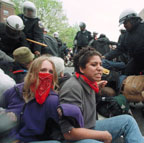|
What's Next?
By Jason Vest
Attempting to disembark in Melbourne for the First International Congress of the Movement Against War and Fascism in 1934, German-Czech
 |
|
Credit:
Jeremy Hogan
|
journalist Egon Erwin Kisch was immediately asked by the Australian authorities if he was a Communist. His answer was confounding enough to result in his detention. "Splendid, splendid!" he said, savoring the inanity of the question. "I can tell you straight off that I will neither make a point of my affiliation with any party nor distance myself from any party by emphasizing my non-affiliation."
That more than 10,000 eclectic protesters came to Washington in the spirit of Kisch's salutation continues to vex so-called opinion-makers well past the actual event. Apparently the punditocracy's view of democracy requires that a succinct, focused press release be placed before them; anything more spontaneous, organic, diffuse and overarching invites scorn.
In the weeks since A16, the op-ed pages have been filled with sardonic snarling. Snidely attempting to conjure a vision utterly at odds with the reality of the protests, Atlantic Monthly editor Michael Kelly sneered in the Washington Post, "Actually, kids, not to be rude about it, but it must by now have occurred to the swifter among you that you don't possess anything that can coherently be called a cause." Post columnist Marc Fisher characterized the demonstrators as "overindulged children searching for ways to upset their elders." The New York Times op-ed page spent days unleashing a torrent of vitriolic and unsubstantiated diatribes against the protesters. And just in time for May Day, The New Republic posed the question, "Does the New New Left Have a Brain?" on its cover, and inside introduced the "New New Left" as "Bold, Fun and Stupid," with a more prosaic accent on the latter.
There are myriad other examples. Not that the coverage was all bad; media analyst Seth Ackerman of FAIR was pleasantly surprised by the news reporting on A16. "I think reporters were forced to acknowledge criticisms of the IMF/World Bank because of the concerns of the elites," he says. "Op-ed types feel free to ignore the criticisms or distort them. Generally speaking, the news reporting on the protests was infinitely better than the commentary, which was atrocious."
Sadly, it seems that the pundits carried the day. Though columnists are by no means obliged to report, it's nonetheless disconcerting that the authors of the aforementioned righteous ripostes chose to disregard the obvious: (1) young people are an integral part of any movement, and, thanks to workshops and teach-ins, many left more educated than they came; (2) there is a learning curve for followers in every movement, especially one as nascent as this; and (3) the vast majority of people who turn out to protest for or against anything - abortion, war, school prayer, Mumia, whatever - are moved more by an intuitive sense of right and wrong than a need for cerebral discussion.
Unlike the events prior to the protests - forums, panel discussions, teach-ins - protests themselves are not designed to be venues for Socratic dialogue or policy formulation, but for visceral expression and street theater. Simply put, it's asking too much of anyone at a protest - or the polling place, for that matter - to offer up a full intellectual articulation of their reasons for being there.
Jason Vest is a contributing editor of In These Times.
![]()
|
In These Times ©
2000
Vol. 24, No. 13 |
